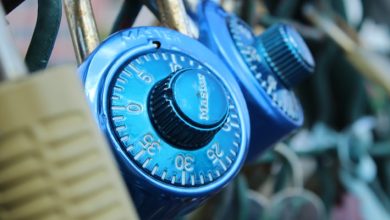The Importance of Strong Passwords for Key Security

- Understanding the significance of strong passwords
- How weak passwords can compromise your security
- Tips for creating unbreakable passwords
- The role of password managers in enhancing security
- Common password mistakes to avoid
- Why regularly updating your passwords is crucial for key security
Understanding the significance of strong passwords
It is crucial to understand the importance of having strong passwords to protect your personal and sensitive information from cyber threats. A strong password is one of the first lines of defense against unauthorized access to your accounts and data.
When creating a password, avoid using easily guessable information such as your name, birthdate, or common words. Instead, opt for a combination of uppercase and lowercase letters, numbers, and special characters to make it more complex and difficult to crack.
Using the same password for multiple accounts can also pose a security risk. If one of your accounts gets compromised, cybercriminals could potentially gain access to all of your accounts. It is recommended to use unique passwords for each account to enhance security.
Regularly updating your passwords is another good practice to prevent unauthorized access. Changing your passwords periodically can help protect your accounts from being compromised due to data breaches or other security incidents.
Remember, the security of your online accounts and personal information is in your hands. By creating and maintaining strong passwords, you can significantly reduce the risk of falling victim to cyber attacks and safeguard your digital presence.
How weak passwords can compromise your security
Weak passwords can pose a significant threat to the security of your personal information online. When you use passwords that are easy to guess or common phrases, you are making it much easier for hackers to gain unauthorized access to your accounts. This can lead to identity theft, financial loss, and other serious consequences.
Many people use passwords that are simple and easy to remember, such as “123456” or “password.” These passwords are extremely weak and can be cracked in a matter of seconds by automated programs that are designed to guess passwords. Once a hacker has access to one of your accounts, they may be able to access other accounts as well, putting your entire online presence at risk.
It is important to use strong passwords that are unique to each account and include a combination of letters, numbers, and special characters. This makes it much harder for hackers to guess your password and gain access to your accounts. Additionally, it is recommended to change your passwords regularly to further enhance your security online.
Tips for creating unbreakable passwords
Creating strong passwords is crucial for ensuring the security of your sensitive information online. Here are some tips to help you create unbreakable passwords:
1. **Use a combination of uppercase and lowercase letters, numbers, and special characters** to make your password more complex and difficult for hackers to guess. Avoid using easily guessable information like your name, birthdate, or common words.
2. **Make your password at least 12 characters long** to add an extra layer of security. Longer passwords are generally more secure than shorter ones, as they are harder for hackers to crack through brute force attacks.
3. **Avoid using the same password for multiple accounts**. If a hacker manages to crack one password, they could potentially have access to all of your accounts. Instead, create unique passwords for each account to minimize the risk of a security breach.
4. **Consider using a password manager** to help you generate and store complex passwords securely. Password managers can help you keep track of all your passwords without having to remember each one individually.
5. **Regularly update your passwords** to ensure that your accounts remain secure. Set a reminder to change your passwords every few months or after a security breach to stay one step ahead of potential hackers.
By following these tips, you can create strong and unbreakable passwords to protect your valuable information and maintain key security online.
The role of password managers in enhancing security
One effective way to enhance security online is by using password managers. These tools help users generate and store complex, unique passwords for each of their accounts, reducing the risk of unauthorized access. By using a password manager, individuals can create strong passwords that are difficult to crack, thus improving the overall security of their online accounts.
Common password mistakes to avoid
When creating passwords, it is important to avoid common mistakes that can compromise the security of your accounts. One common mistake is using simple and easily guessable passwords, such as “123456” or “password”. These types of passwords are not secure and can be easily cracked by cyber criminals.
Another mistake to avoid is using the same password for multiple accounts. If one of your accounts is compromised, all of your other accounts using the same password are also at risk. It is important to use unique passwords for each of your accounts to minimize the potential damage of a security breach.
Avoid using personal information in your passwords, such as your name, birthdate, or address. This information is often easy to find online or through social engineering tactics, making it easier for hackers to guess your password. Instead, use a combination of letters, numbers, and special characters to create a strong and secure password.
Lastly, avoid storing your passwords in unsecured locations, such as on sticky notes or in a plaintext document on your computer. If a cyber criminal gains access to these passwords, they can easily access your accounts and steal sensitive information. Use a reputable password manager to securely store and manage your passwords.
Why regularly updating your passwords is crucial for key security
Regularly updating your passwords is vital for maintaining the security of your sensitive information online. By changing your passwords frequently, you can reduce the risk of unauthorized access to your accounts and prevent potential cyber threats.
It is important to understand that using the same password for an extended period of time makes it easier for hackers to gain access to your accounts. By regularly updating your passwords, you can stay one step ahead of cybercriminals and protect your personal and financial information from being compromised.
Furthermore, updating your passwords regularly can help mitigate the risk of data breaches and identity theft. By changing your passwords on a consistent basis, you can minimize the chances of cyber attackers gaining access to your confidential data and using it for malicious purposes.
In conclusion, regularly updating your passwords is a simple yet effective way to enhance the security of your online accounts. By taking proactive measures to protect your information, you can safeguard your digital identity and minimize the risk of falling victim to cybercrime. Stay proactive and stay secure by updating your passwords frequently.



